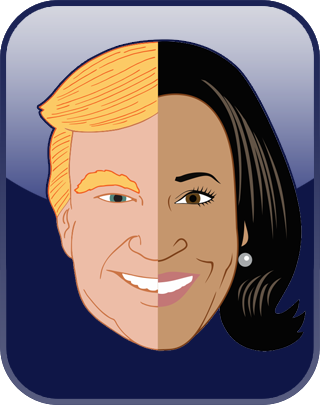Harris or Trump Test
Based on data from YouGov, machine learning, and the scientific Moral Foundations Theory, this test will determine whether your morality is more like that of Harris or Trump.
To take the test, indicate your answers to each of the following questions below.
Question 1 of 26
America should accept more refugees from war zones around the world.
| Disagree | Agree |
NEXT
The IDRlabs Harris or Trump Test was compiled from various studies in Moral Foundations Theory. The test provides an informed pointer on the morality of each candidate’s moral foundations, as extracted from studies and polls. The test is merely a snapshot related to Moral Foundations Theory and should not take the place of familiarizing oneself with the policies of each candidate in depth.
The moral foundations of empathy, markets, heritage, and freedom are central to understanding the policy and ideological positions of prominent political figures like Kamala Harris and Donald Trump. These foundations shape their responses to key societal issues, revealing deep philosophical divides.
Empathy involves understanding and sharing the feelings of others, and it often drives policies aimed at reducing suffering and promoting social justice. Kamala Harris's policy positions reflect a strong foundation of empathy. Her support for expanding social safety nets, criminal justice reform, and immigrant rights underscores her commitment to addressing systemic inequalities and aiding marginalized groups. Harris's advocacy for decriminalizing drugs and her stance on expanding gay rights further illustrate her empathetic approach, prioritizing the well-being and dignity of individuals over punitive measures and traditional constraints.
In contrast, Donald Trump's approach to empathy is often less pronounced in his policy positions. His focus has been more on pragmatic solutions and economic growth rather than social welfare. For instance, his stance on reducing regulations for pharmaceutical companies can be seen as a way to boost innovation and economic efficiency rather than a direct appeal to the emotional or moral aspects of empathy. Trump's policies, such as his opposition to further drug decriminalization, reflect a more conservative approach that prioritizes law and order over the empathetic considerations of social harm reduction.
Markets represent the economic system where supply and demand dictate the distribution of resources. Trump's support for market-oriented policies is evident in his approach to deregulation and tax cuts. His administration's emphasis on reducing corporate taxes and limiting regulatory burdens aligns with the belief that free markets drive economic growth and individual prosperity. Trump’s market philosophy rests on the idea that economic freedom and entrepreneurial spirit lead to broader societal benefits.
Kamala Harris, while supportive of markets, advocates for more regulated and equitable economic systems. She supports measures like increasing taxes on the wealthy and expanding social safety nets, which aim to address income inequality and ensure that the benefits of economic growth are more widely distributed. Harris’s approach reflects a belief in markets tempered by regulation and social interventions to correct imbalances and promote fairness.
Heritage refers to the traditions and values inherited from the past, shaping a nation’s identity and continuity. Donald Trump’s policies often emphasize preserving traditional American values and heritage. His rhetoric about maintaining cultural and national integrity resonates with his base, which values traditionalism and national pride. Trump's focus on conservative values and nationalism reflects a commitment to heritage that emphasizes historical continuity and cultural preservation.
Kamala Harris’s perspective on heritage is more inclusive and progressive. She emphasizes diversity and the evolution of American identity, reflecting a belief that heritage should evolve to be more inclusive of various racial, ethnic, and cultural backgrounds. Harris’s policies support broader recognition of diverse contributions to American history and advocate for historical correction and inclusivity.
Freedom is a core value in American political discourse, encompassing personal liberties and economic autonomy. Trump’s policies strongly emphasize individual freedoms, particularly in relation to economic activities and Second Amendment rights. His administration’s stance on deregulation and gun ownership reflects a commitment to preserving personal and economic freedoms.
Kamala Harris also values freedom, but with a focus on balancing it with social responsibility. Her approach includes ensuring that freedom does not come at the expense of public welfare or equality. Harris supports regulations and interventions designed to protect individual rights while also addressing systemic inequalities and ensuring that freedoms are equitably distributed.
In summary, Harris and Trump approach the moral foundations of empathy, markets, heritage, and freedom from distinct perspectives. Harris’s policies are driven by a focus on empathy and social equity, while Trump’s emphasize economic efficiency, traditional values, and individual liberties. Understanding these foundational differences provides insight into their broader political and ideological divides.
The authors of this free online Harris or Trump Test are certified in the use of various personality tests and have worked professionally with psychology, political psychology, and personality testing. Prior to using our free online test, please note that the results are provided "as-is", for free, and should not be construed as providing professional or certified advice of any kind. For more on our Harris or Trump Test, please consult our Terms of Service.

